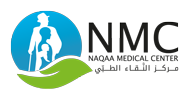Patient Guide
Have Some Questions?
SOME OF YOUR QUESTIONS:
We are a medical center consisting of general medicine, specialized and dental clinics.
We provide laboratory tests, radiology and ultrasound scans to the best standards, encompassing the latest technologies and performed by elite doctors and healthcare professionals.
Because we are the leading medical center in the region.
Naqaa Medical Center have concluded agreements with reputable insurance companies who are committed to continue providing high level technical solutions coupled with professional administration services and maintaining the distinguished performance it affords its clients and strengthening the bonds that it has forged with them.
Naqaa Medical Center welcomes patients that are under the Lebanese National Social Security Fund (NSSF) and provides them with the special associated rates across our various departments.
Employees of the Lebanese Internal Security Forces (ISF) are also covered in our center under agreements held with the related parties.
- Monday – Friday: 8.00 AM – 4.00 PM
- Saturday: 8.00 AM – 2.00 PM
- Sunday: Closed
- Our laboratory welcomes you from 7.00 AM
Maintaining your blood sugar levels within normal or natural similarity is the best way to reduce the risk of complications from diabetes.
The higher the levels of sugar in your blood, the greater the risk of:
- Eye Diseases,
- Kidney,
- Heart,
- Blood Vessels, and
- Nerves.
Make sure you have:
- Exercise program
- Daily pills to relieve pain, if your doctor agrees.
- Proper treatment against high blood pressure and high cholesterol.
- An annual examination to detect protein in the urine.
- An annual eye examination by the optometrist or ophthalmologist. This is the only way to detect the signs of damage in your eyes.
- A daily program for the treatment of feet.
- Non-smoking.
- Make sure your vaccine record is up-to-date.
Experts do not know the exact cause of thyroid cancer but they know that people who have been exposed to high doses of radiation – whether from medical treatment or from the environment – were more likely to develop thyroid cancer. Dental imaging from one period to another does not increase the risk of thyroid cancer, but previous radiotherapy in the head, neck or chest (especially during childhood) may increase the risk of thyroid cancer. Radiology has been used since the 20th to 50s to treat problems such as acne and bloated almonds, but this method is no longer used to treat non-cancerous conditions.
Vitamin B12 deficiency can be slow to develop, causing symptoms to appear gradually and intensify over time. It can also come on relatively quickly. Given the array of symptoms a vitamin B12 deficiency can cause, the condition can be overlooked or confused with something else. Vitamin B12 deficiency symptoms may include:
- strange sensations, numbness, or tingling in the hands, legs, or feet
- difficulty walking (staggering, balance problems)
- Anemia
- a swollen, inflamed tongue
- difficulty thinking and reasoning (cognitive difficulties), or memory loss
- weakness
- fatigue
While an experienced physician may notice the symptoms and be able to detect a vitamin B12 deficiency with a good interview and physical exam, a blood test is needed to confirm the condition.
It’s a good idea to ask your doctor about having your B12 level checked if you are a strict vegetarian or have had weight-loss surgery or have a condition that interferes with the absorption of food.
Early detection and treatment is important. If left untreated, the deficiency can cause severe neurologic problems and blood diseases.
A TSH test is done to find out if your thyroid gland is working the way it should. It can tell you if it’s overactive (Hyperthyroidism) or underactive (Hypothyroidism). The test can also detect a thyroid disorder before you have any symptoms. If untreated, a thyroid disorder can cause health problems.
TSH stands for “Thyroid Stimulating Hormone” and the test measures how much of this hormone is in your blood. TSH is produced by the pituitary gland in your brain. This gland tells your thyroid to make and release the thyroid hormones into your blood.
The Test:
The TSH test involves simply drawing some blood from your body. The blood will then be analyzed in a lab.
It’s best to do this in the morning as your TSH levels can fluctuate throughout the day. No preparation is needed (such as overnight fasting). However, if you’re on certain medications, like dopamine and lithium, you may need to come off them beforehand. Check with your doctor to find out. You shouldn’t feel any pain beyond a small prick from the needle in your arm. You may have some slight bruising too.
Mammograms are x-rays of the breasts completed in privacy by a specially-trained female technologist.
A screening mammogram consists of four images (two of each breast) that look for hidden cancer in women who are healthy (no symptoms) and have never had breast cancer.
Those experiencing symptoms including a lump or nipple discharge should see their doctor immediately to determine if other testing is required.
For more information about mammography, visit our center Monday to Friday 8am-4pm / SAT 8am-2pm /Bir Hassan.
We are happy to answer any questions.


